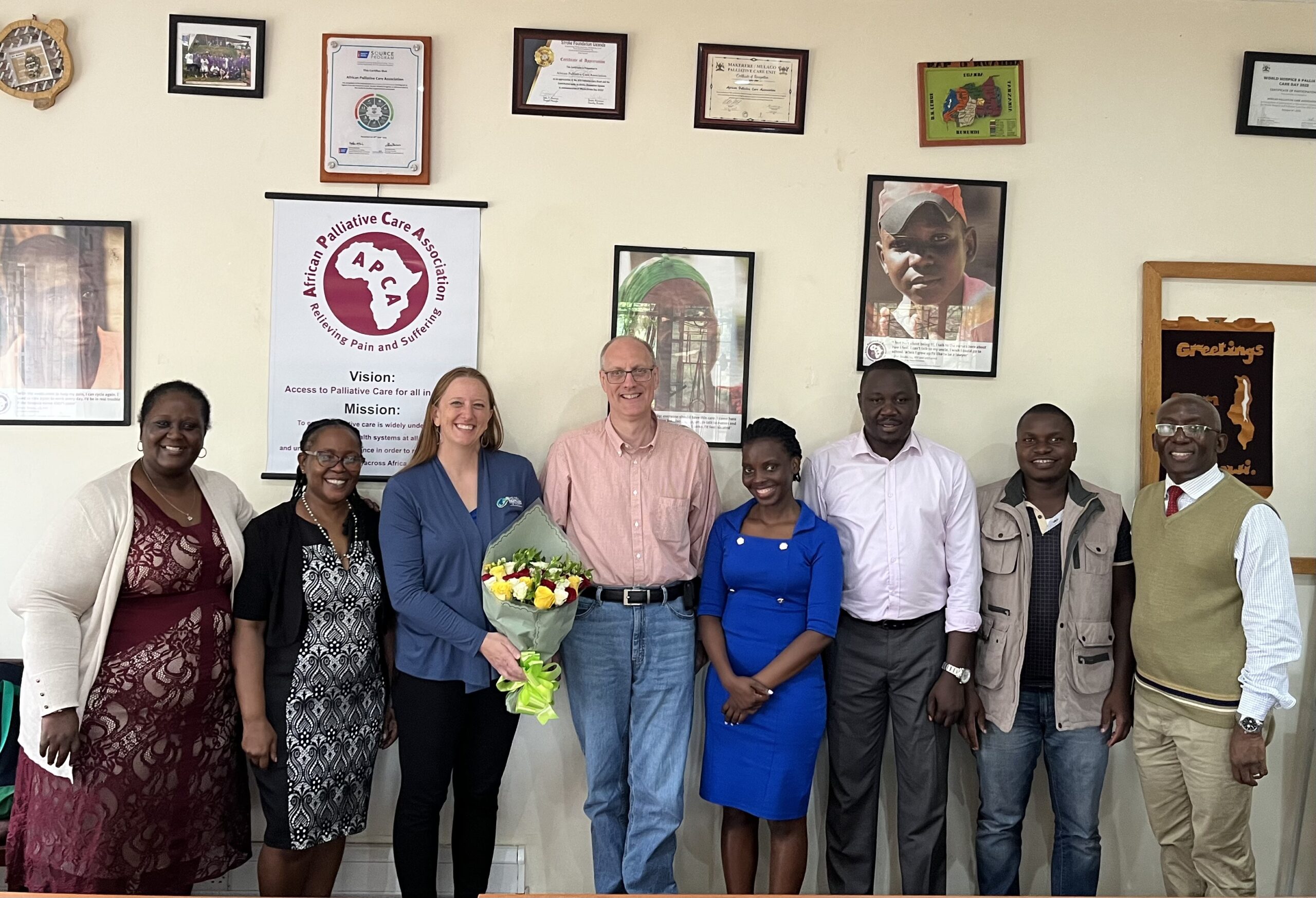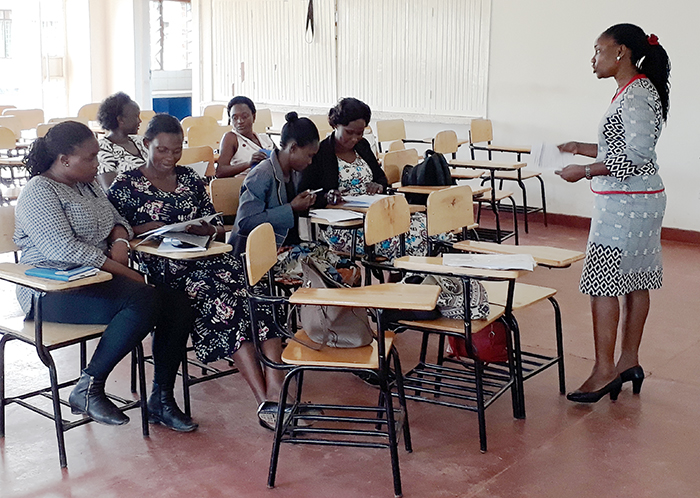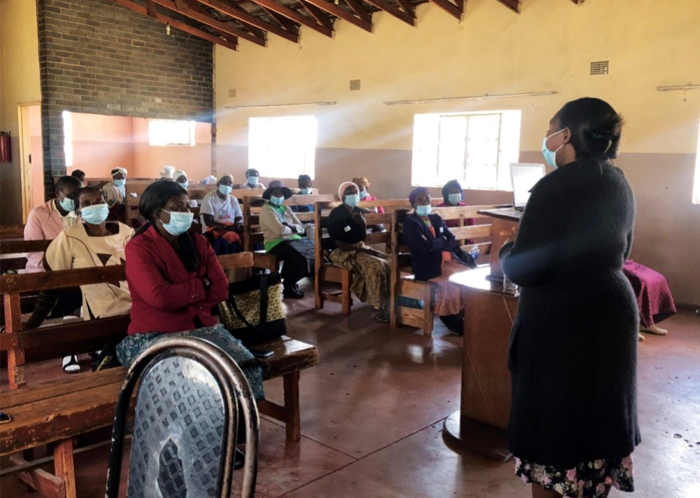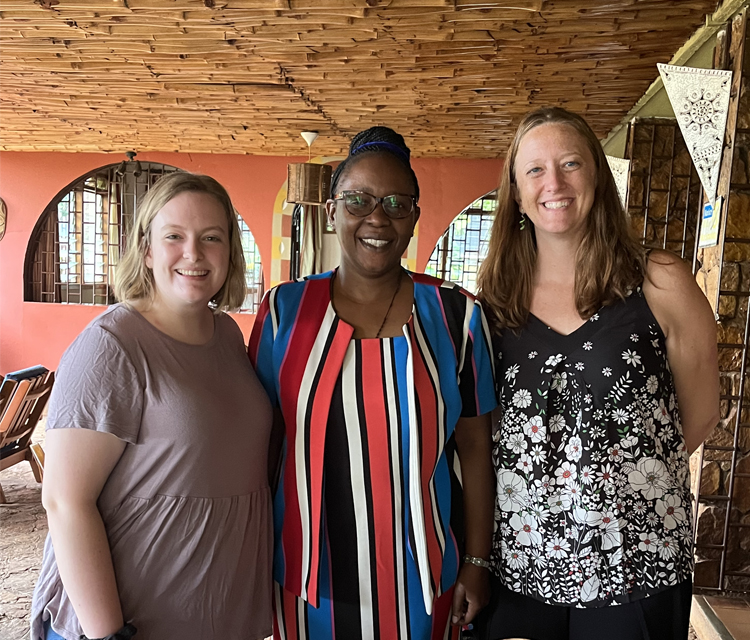20 Years of Collaboration between the African Palliative Care Association and Global Partners in Care
This year, 2024, marks the 20th anniversary for the African Palliative Care Association (APCA) and the 25th anniversary for Global Partners in Care (GPIC). As collaborative partners, both organizations celebrate their shared legacy of working to expand access to palliative care services in Africa. The underlying foundation for their shared legacy is many friendships between those on both continents that have been fortified through a joint mission of caring for those with life-threatening conditions.
Establishing the Foundation for a Meaningful Partnership
APCA grew out of the Cape Town Declaration in 2002, a joint statement from 28 palliative care leaders from around Africa stating that palliative care and symptom control were a human right for every adult and child with a life-limiting illness. From there, APCA was formally founded in Tanzania in 2004. With Uganda’s record of palliative care development on the continent, APCA’s first office was opened in Kampala, Uganda in 2005.
The Foundation for Hospices in Sub-Saharan Africa (FHSSA), now Global Partners in Care, has been a partner of APCA since the very beginning. In coordination with the Diana, Princess of Wales Memorial Fund, FHSSA and the National Hospice and Palliative Care Organization (NHPCO) secured a grant to establish the Diana Legacy Fund to support hospice and palliative care work on the African continent. Part of this funding supported the founding of APCA.

GPIC’s Cyndy Searfoss presents at APCA’s 7th International African Palliative Care Conference

The APCA and GPIC teams together in Kampala, Uganda
The success of the relationship today would not be possible without the groundbreaking work of trailblazers both here in the United States and across the African continent. When asked what he credited to the long-term success of the APCA-GPIC relationship, former NPHCO president and CEO, Donald Schumacher says that “both sides have maintained a commitment to shared learning.” This shared learning has brought together those of different cultures and traditions and has fostered mutual compassion allowing for successful collaboration built on dear friendship.
Many leaders have had a profound impact in supporting the work of the APCA-GPIC relationship to transform it into what it is today. From the US these include Dr. Bernice Catherine Harper, Philip DiSorbo, Peter and Peggy Sarver and other notable early pioneers of FHSSA. In addition, this relationship would not have been possible without leaders from NHPCO including Donald Schumacher, Dr. Galen Miller, and other leaders on the African continent including Faith Mwangi-Powell, the first Executive Director of APCA. Furthermore, many leaders from the Hospice and Palliative Care Association in South Africa played vital roles in supporting the work of APCA and GPIC including Professor Liz Gwyther, Joan Marston, Andre Wagner, and many others. As the relationship between APCA and GPIC has evolved, new leaders have learned from these mentors, as they take on the collaborative work between APCA and GPIC today.
Shared Impact on the Continent
Since the start of the APCA-GPIC partnership 20 years ago, both organizations have collaborated on many areas of work. One of the earliest accomplishments of the partnership was the implementation of a President’s Emergency Plan for AIDS Relief (PEPFAR) grant in Tanzania. Together, both organizations worked with the Evangelical Lutheran Church of Tanzania (ELCT) to build palliative care capacity in Tanzania. As a result of their efforts, palliative care programs were established within ELCT, training was provided throughout the country and 13 palliative care units were opened in rural hospitals.
In 2014, APCA and GPIC brought together experts from around the continent to produce the Guidelines for Clinical Placement in Hospice and Palliative Care. The guidelines served many purposes with the overarching goal of building upon historic efforts to grow palliative care education and training in Africa. The guidelines assisted African health systems in clinical training and developing mentorship programs for those trained in palliative care in ways that were consistent across contexts and disciplines.


An ongoing accomplishment of the APCA-GPIC collaboration is the African Palliative Care Education Scholarship Program. To date, the joint initiative has awarded 73 palliative care education scholarships across 16 countries over the last 13 years. The training supported by the scholarship program has been at the certificate, diploma, bachelor’s and master’s level. Recipients have primarily been nurses or social workers, but as palliative care becomes more established on the continent, the scholarship program has evolved to support other professions. Building upon this, APCA and GPIC are targeting new countries each year with the scholarship program to expand access to trainings across the continent.
Throughout their shared history and into today, APCA and GPIC have collaborated to support national hospice and palliative care associations and leaders across the continent. These national associations have gone on to play vital roles in the development of national palliative care policies, expanding access to essential medicines, educating providers across their respective countries, and supporting the development of evidence-based research in palliative care. As the field of palliative care has evolved around the world, supporting these national associations has proven to be one of the most impactful aspects of their collaborative work.
Beyond the monumental accomplishments shared between APCA and GPIC, there are many other noteworthy collaborations. From educational webinars to the shared advising of student learners, both organizations have found new ways to incorporate one another into the many different facets of their respective work.

Lydia Thomas (left), an intern for both APCA and GPIC, with her mentors Dr. Eve Namisaongo (middle) and Lacey Ahern (right)
A Foundation with Endless Possibilities for Growth
Building off the relationships started by those at the beginning of the APCA-GPIC relationship, Faith Mwangi-Powell poses a challenge for the future, “I think there is so much foundation when you look at the partnership between GPIC and APCA, and that foundation really gives us the roots to even aim better, aim higher, and be stronger.”
As both organizations continue to evolve, their shared collaborative efforts will remain a core principle of their work. Great strides have been made in expanding access to palliative care across the continent, but there is still much work to be done to ensure patients and families have access to essential palliative care services. “As much progress has been made, we know there is much more to be done. What has yet to be achieved is not a burden, but goals we will reach in collaboration with our partners at APCA” said John Mastrojohn III, President & CEO of Global Partners in Care.
When asked about the future of the collaboration between APCA and GPIC, current APCA executive director Dr. Emmanuel Luyirika shares the following, “This partnership is very important because it helps us to focus on the key aims of making sure that we have qualified personnel to move the agenda forward, but also that they are able to strengthen the partnerships between our organizations and that we are able to continuously engage with stakeholders to push the agenda for palliative care within the continent.”
Throughout their 20-year relationship, APCA and GPIC have worked hard to mentor the next generation of palliative care leaders on both sides of the Atlantic. They continue to foster the collaborative spirit and friendship necessary for successful partnership in all they support. The mission of ensuring all have access to palliative care in Africa is challenging, but their continued spirit of collaboration places no limits on their future accomplishments.
